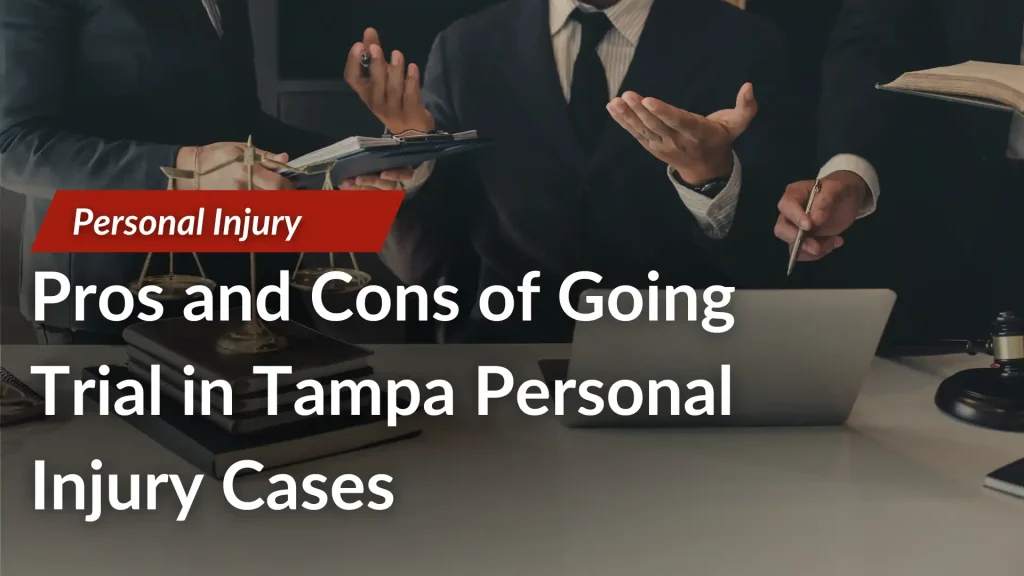 If you suffered injuries due to someone else’s negligence, you may have the right to seek compensation through a personal injury claim or lawsuit. Whether the incident was a car crash, slip-and-fall, dog bite, or pedestrian accident, your first step should always be to retain experienced legal counsel. They will identify the liable party and file an injury claim with their insurance company. But what happens when the insurer doesn’t offer the amount of compensation you believe you deserve? When this happens, you have the option of filing a lawsuit. This moves your case into the Florida legal system and sets up the possibility of going to trial. However, there are pros and cons of a jury trial.
If you suffered injuries due to someone else’s negligence, you may have the right to seek compensation through a personal injury claim or lawsuit. Whether the incident was a car crash, slip-and-fall, dog bite, or pedestrian accident, your first step should always be to retain experienced legal counsel. They will identify the liable party and file an injury claim with their insurance company. But what happens when the insurer doesn’t offer the amount of compensation you believe you deserve? When this happens, you have the option of filing a lawsuit. This moves your case into the Florida legal system and sets up the possibility of going to trial. However, there are pros and cons of a jury trial.
You must consider these benefits and drawbacks before making a decision. What are the advantages and disadvantages of using juries? Your Tampa personal injury lawyer will walk you through your options and help you choose.
The Advantages of Making the Decision to Go to Trial for an Injury Lawsuit
Deciding to proceed to trial when negotiations fail offers some considerable benefits. Some of the possible pros of going to trial include:
- Maximizing Compensation – One of the most compelling reasons to consider a trial is the potential to secure a larger financial award than what might be offered in a settlement. Empathetic individuals typically compose juries, and they may be more inclined to award substantial damages to compensate for your pain, suffering, medical expenses, lost wages, and other losses. On the other hand, insurance companies want to minimize payouts and maximize profits.
- Holding the Responsible Party Accountable – Trials serve as a powerful mechanism for holding negligent parties responsible for their actions. This can be particularly important in cases where the defendant denies liability or attempts to downplay their role. A trial verdict in your favor sends a strong message that their behavior is unacceptable. It can also have a deterrent effect on others.
- Public Awareness and Safety – A successful trial verdict can raise public awareness about specific safety hazards, dangerous products, or negligent practices. This can lead to policy changes, stricter regulations, or improved safety measures. All of these results protect others from similar harm in the future.
- Empowerment and Validation – For many personal injury victims, the opportunity to tell their story and receive validation in a court of law is a crucial step in the healing process. Testifying about your experiences, confronting the responsible party, and receiving a favorable verdict can provide a sense of closure, vindication, and empowerment.
The Risks of Taking an Injury Case to Trial
At the same time, there can be downsides to taking a case to trial. When you’re considering what to do next, take time to think about the following potential risks:
- Years Can Pass Before a Personal Injury Case Is Brought to Trial – Court calendars are notoriously backed up, and criminal defense cases take priority. You may wait longer than you’d like to see the inside of a courtroom finally.
- Financial Investment – Trials can be notoriously expensive. The preparation process involves extensive legal research, gathering and analyzing evidence, deposing witnesses, and potentially hiring expert witnesses. Court fees, attorney fees, and other expenses can quickly add up. These expenses usually get repaid out of whatever you recover. Still, there’s also the matter of medical debt and other expenses to consider.
- Uncertainty and Risk – One Civil Justice Survey of State Courts found that plaintiffs won almost 60 percent of civil trials. Even with a strong case, there is no guarantee of a favorable outcome. A judge or jury may rule against you, leaving you without compensation and potentially liable for court costs.
- Emotional Toll – Trials are emotionally taxing ordeals. Testifying about your injuries, reliving the traumatic event, and enduring cross-examination by the defense attorney can be stressful and retraumatizing for some individuals. It’s essential to consider your well-being and whether you are prepared to manage the emotional challenges of a trial.
- Public Scrutiny and Privacy Concerns – Personal injury trials are matters of public record, meaning that your personal information, medical history, and details of your injuries may become accessible to the public. This can be uncomfortable for some individuals, especially in sensitive cases.
What to Consider When Choosing Between Further Negotiations and Trial

Your decision of whether to go to trial involves considering your unique circumstances and priorities. Consider the following factors:
- Strength of Your Case – Your attorney can provide an objective assessment of the strength of your evidence, the likelihood of success at trial, and the potential value of your claim. Still, trials are unpredictable, and there is always the chance that you will walk away empty-handed.
- Financial Resources – Evaluate your situation and determine whether you can afford a trial’s potential costs and risks.
- Emotional Preparedness – Assess your emotional resilience and whether you are prepared for the stress, anxiety, and public scrutiny that often accompany trials.
- Defendant’s Willingness to Negotiate – Gauge the defendant’s willingness to proceed with good-faith negotiations in pursuit of a fair settlement. A trial may be the only viable option if they are unwilling to offer adequate compensation.
Contact a Tampa Personal Injury Attorney Today
The decision to go to trial in a Tampa personal injury case is highly personal. You know yourself better than anyone else. It’s up to you to determine whether you can handle a trial or if you’d prefer to continue with negotiations.
However, you don’t have to weigh this important decision without outside input. A Tampa personal injury lawyer from Jurewitz Law Group Injury & Accident Lawyers will help you understand your legal rights and options. We’ll review the pros and cons of going to trial, discuss your concerns, and answer your questions. We’re here to help you make an informed choice.
Contact us online or call us today at (619) 233-5020 to get started with a free consultation. There’s no financial risk involved in getting the legal help you need. We work on contingency, meaning you owe nothing upfront, and we only get paid if we recover compensation for you. We look forward to learning about your case and showing how we can help you fight for the justice, compensation, and accountability you deserve.


